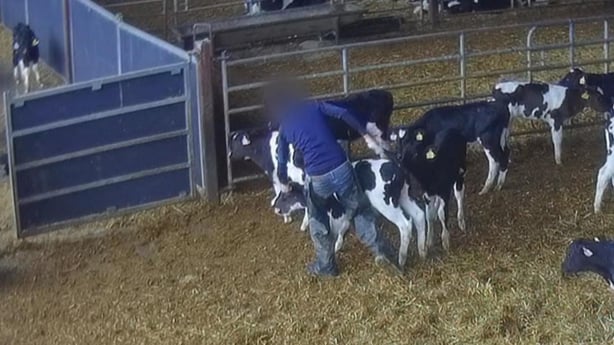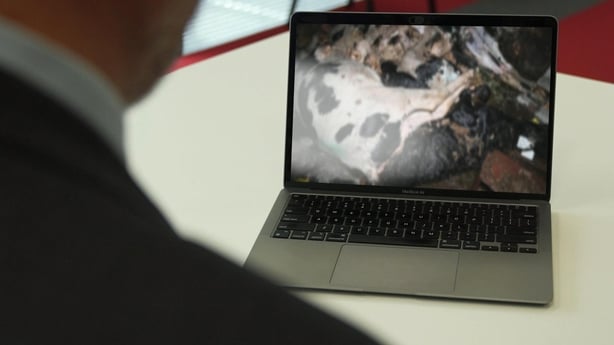Undercover footage recorded in a major cattle export facility in Kerry has revealed Irish bull calves being repeatedly struck in the face, force-fed, jabbed with tools, and dragged by the ears and tail.
It also shows how dead animals were piled into a mound and left to rot outside, which raises major disease-risk concerns, according to leading animal welfare expert Dr Simon Doherty of Queen's University Belfast.
He described what he saw in the footage as cruelty.
"I think where there's kicking and screaming and slapping and prodding with pitchforks, that is at the cruelty level. Good animal handling should be quiet, it should be calm, it should be supportive," he said.
The footage will be broadcast as part of a special RTÉ Investigates report on Prime Time tonight. It reignites questions raised by RTÉ Investigates in July 2023 about the treatment of Irish bull calves here during the live export process.
Following that investigation the then-taosieach Leo Varadkar described the cruelty exposed as "repugnant" and he told the Dáil that the Department of Agriculture would commence a "robust and timely" investigation into the incidents highlighted.
Denis Drennan, President of the Irish Creamery Milk Suppliers Association (ICMSA), said what he saw in the new footage is "completely unacceptable."
The footage was filmed in Hallissey Livestock Exports in Fossa, near Killarney in March. It was recorded on cameras secretly placed and brought onto the site by animal rights campaigners, and provided to RTÉ Investigates.

Watching the footage, Mr Drennan said "there's a man there with a stick beating calves. It's completely abolished and against the law, and there's a man there with a pitchfork, trying to run calves out the gate - completely unacceptable."
Calves are prepared for export on trucks at the facility. Mr Drennan says footage of two calves being force fed using stomach tubes raises concern about why they are at the facility in the first place.
"They should not need to be stomach-tubed, because they’re not drinking freely on their own under no circumstances should either of those animals be travelling," he said.
"The rules and regulations say that if an animal is not fit to travel, it shouldn’t travel. It’s going to damage the reputation that we have across Europe of providing top quality, fit, healthy animals," he added.
Cameras also captured over four days several dead calves being removed from sheds. Some were dragged out by farm hands, others lifted using a teleporter.
They were placed on a mound of dead and decaying calf carcasses lying in the open air, rain pouring over them.
The eyes of several calves had been eaten out by birds and vermin, one animal had been there so long its cowhide had been bleached and worn away.
Dr Simon Doherty of Queen's University Belfast said it appeared some of the animals have been there for weeks.
"If those are still within sight, sound, smell of other living animals, I mean that's just absolutely fundamentally wrong from a welfare perspective, there's a huge disease risk," he said.

"It looks like they’re just thrown in a heap somewhere. I just really don’t understand, it beggars belief that somebody would leave animals that length of time around their premises," Mr Drennan said.
"The regulations state that a dead animal should be covered by a tarpaulin and removed as soon as possible, that’s certainly not happening here," he added.
There are strict rules nationally and at EU level regarding the storage and removal and storage of dead animals. Those rules state that an animal collector must be contacted as soon as possible after death.
The regulations say the carcasses, "should be held securely in an enclosed building, or in an area away from livestock under suitable cover, as a tarpaulin."
In response to queries from RTÉ a solicitor for Hallissey Livestock Exports said that their client’s business "provides a valuable service to the farming community and at all times takes reasonable care to ensure it does so in a manner which protects the welfare of the animals in its charge."
Pointing out that Hallissey Livestock Exports Limited is regulated by the Department of Agriculture, the solicitor’s letter states, "while no system is ever perfect, it is satisfied that its business is compliant with the highest standards."
'RTÉ Investigates, Live Exports: On the Hoof', will be broadcast on Prime Time on Tuesday at 9.35pm



